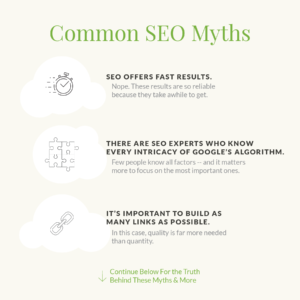Content Writing, SEO

At its core, law firm SEO is a simple concept. It’s about creating a great user experience through website design and content marketing. There are no shortcuts to claiming top rankings for your law firm website. You’ll need a sound technical SEO foundation, content strategy, and white-hat link building.
You could spend hours researching law firm SEO strategies and tactics. There’s a lot of information available. Unfortunately, there’s also a lot of misinformation about SEO and Google’s algorithm, and it can be difficult to tell the difference.

We hear these common myths about law firm SEO time and time again – and we thought it was time to de-bunk them.
1. SEO offers fast results.
If you’re ever promised top rankings for your law firm in a month, it’s a red flag. Google takes time to crawl, index, and rank new content – and the legal space is very competitive. If your law firm hasn’t actively pursued an SEO strategy in the past, it could take 6 months to see measurable results to your bottom line.
If your law firm needs to generate new cases quickly, there are other marketing investments that can deliver that, such as paid search or legal direct mail. SEO takes time, and anyone with experience in optimizing legal websites will tell you that it’s not realistic to expect results within a month.
2. There are Law Firm SEO experts who know every intricacy of Google’s algorithm.
Google’s algorithm is comprised of over 200 factors – and any SEO who claims to know them all is quite frankly lying. The algorithm is complex and ever-changing, so the best approach is to focus efforts on tried-and-true tactics that are verified as being integral ranking factors. Content, page speed and backlinks are three examples of factors that we know are important to Google’s algorithm.
The algorithm also personalizes search results and uses artificial intelligence, and we know very little about the extent to which they do these things. Google often runs tests, so it’s possible for your website ranking to fluctuate simply because Google is testing something. It’s impossible to know every intricacy of the algorithm, as Google keeps this information private. For every ranking factor we know about, there are a handful more that we can only make educated guesses about.
As SEO professionals, it’s not easy to admit we don’t know it all. There are times we see fluctuations in rankings and despite our best efforts, we’re only able to hypothesize contributing factors. That’s simply how SEO works – and your SEO specialist or agency should be up-front about that.
3. You can do SEO as a one-time project.
SEO stands for search engine optimization, and that last word is a key part of your law firm’s strategy. Although setting an initial strategy requires more up-front work, SEO is always going to require maintenance and optimization. As an SEO program matures, more data becomes available. This data is what SEOs use to continuously improve their efforts. You’ll also need to continuously produce and optimize content on your website and legal blog – a key piece of your overall SEO strategy.
SEO changes all the time. The rise in mobile phone use has prompted SEOs to re-think their approach to mobile website development. Voice search is becoming more important to consider. New law firms in your area may increase their digital marketing efforts, creating tougher competition for your website. If you’re not always optimizing your website, you risk losing your rankings and new business to your firm.
4. It’s important to build as many links as possible.
Links remain one of the most important pieces of Google’s algorithm. However, many law firms engage in linkbuilding practices that could ultimately lead to a Google penalty. Google has explicitly stated that in terms of links, quality matters. Buying links is against Google’s policies and can lead to a penalty, and low-quality links will do nothing for your SEO strategy.
Focus your efforts on creating great content and being active in your local community. These are the building blocks of a white-hat SEO approach; you should naturally gain relevant, authoritative backlinks over time. A sharp increase in low-quality links is unnatural, and focusing on quantity of links will do more harm than good.
5. SEO is hard to measure.
We hear this from attorneys all the time. They’ve had some SEO work done to their website, but they’re unclear on how it’s affecting their business. SEO can actually be very easy to measure; it just requires some effort. You should never engage in any SEO work if you don’t have a plan for how you’ll measure results through website analytics and call-tracking software.
Reporting and measurement should be an integral piece of your SEO strategy. At minimum, you should be tracking your traffic from natural search, top keywords, rankings and how many calls your firm is receiving from potential clients as a result of your SEO efforts.
6. If I hire a great law firm SEO agency, I don’t need to pay much attention to it.
At Postali, we often see that the attorneys who are actively involved in their SEO strategy have the best results. Even if you have highly-skilled SEO professionals working on your website, they need to understand your business. Who are your target clients? What sets you apart from other law firms? Are there areas of your business you’re looking to grow? What does your intake process look like? These are just a few questions that can help provide strategic direction for your SEO program.
There are also certain things that an SEO professional cannot do – such as ask your clients for Google reviews. Working with an SEO agency should feel like a partnership, and you can’t expect results if you simply hire someone to do SEO and provide little guidance or direction.
7. Google algorithms are scary.
A few times a year, you’ll read about a major Google algorithm update, and SEOs turn this into a sales tactic. You’ve probably read a few e-mail subject lines similar to the following: “Google’s major algorithm update is coming. Are you prepared?”
While there are major algorithm updates to be aware of, the truth is that Google’s algorithm changes daily. These changes are in an effort to reward websites that provide the best user experience, and to penalize websites that engage in spammy or manipulative practices like buying links and copying content.
Yes, you do need to monitor algorithm changes, but there generally isn’t a reason to worry if you’re focusing on best-in-class SEO strategies, like creating valuable content that helps your potential clients solve a need.
8. I can do my law firm’s SEO myself or have an intern to do it.
This may be true – but in our experience it’s highly unlikely that an attorney will have the time and expertise needed to perform SEO on their own website. Many people underestimate the amount of time it takes to optimize a website for search engines. It’s hours of planning, content strategy, link analysis, reporting and keyword research. Most attorneys simply don’t have the time commitment it requires.
Law firm SEO is extremely competitive, and it requires expertise and a time commitment that’s very difficult to achieve without hiring someone with the right experience. Whether you hire in-house or use an agency, you’ll want to ensure anyone performing SEO on your website not only has experience in SEO, but understands how to effectively optimize a legal website while complying with attorney advertising ethics guidelines.
9. All SEO agencies do the same thing.
SEO is complex, and not all marketing agencies share the same approach. If you asked 10 different legal SEO agencies about their stance on ethical linkbuilding, you’d probably get several different answers. It’s important to thoroughly research any company you’re considering using for SEO services. Ask for references, case studies and results and their policies on working with direct competitors.
This is a pain point for a lot of attorneys. At the end of the day, you should feel 110% confident in the people executing your SEO strategies.
10. SEO is free traffic.
We’ve saved one of the most common misconceptions for last. While you do not pay Google directly for your placement in organic search like you would paid social media or PPC, it can be problematic to think about it as free business.
SEO does require investment in tools, talent and time. It needs to be a line item in your law firm’s overall marketing budget. It should have a high return on your investment, but it’s not completely free. It’s better to think of it as a profitable, low-cost way to bring more business to your law firm.
As an attorney, it’s your job to question everything – and you should apply the same principles to your marketing strategy. What you read about SEO may be false or misleading, so it’s important to find a law firm marketing partner you trust – like Postali.




